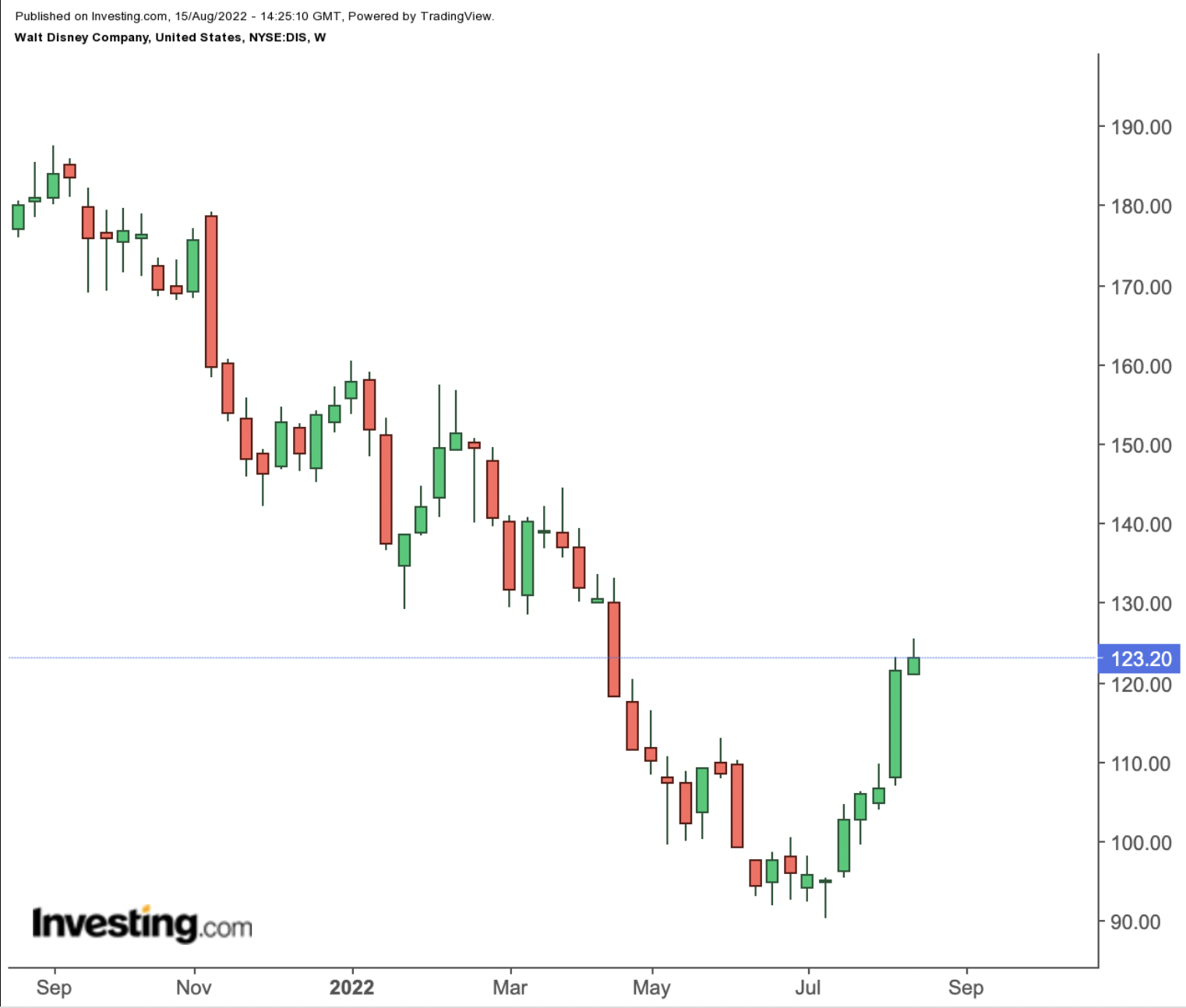- Even adjusting for current losses — and future profits — from streaming, Disney’s valuation is not cheap
- Looking forward, there are concerns about almost every aspect of the business, even with Third Point’s re-engagement
- The 'pay up for quality' argument backing DIS only works if the business indeed is quality. That’s still up for debate
Based on the Wall Street consensus estimate, Walt Disney Company (NYSE:DIS) stock trades at 31x fiscal 2022 earnings (ending September) and 22x looking to FY23. Neither multiple is particularly cheap.
Of course, Disney’s earnings are depressed at the moment. Most notably, the company is generating significant losses as it invests behind its various streaming services. According to Disney’s Form 10-Q (see p.49), in the first three quarters of FY22, Disney’s Direct-to-Consumer segment lost $2.54 billion.
After-tax, that’s more than $1 per share, and close to $1.50 for the full year. Add that back to the $3.94 consensus estimate EPS for this year and Disney’s current earnings power is roughly $5.40 per share, or almost $10 billion annually. And even that figure doesn’t account for eventual profitability from streaming, which management projects will arrive in fiscal 2024.
The catch with DIS stock, however, is that even adjusting for the streaming business, the stock still is trading at well past 20x earnings. From one perspective, that kind of multiple is at least reasonable for what has been one of the great American businesses of all time. Indeed, many investors have taken that view of late: DIS has bounced 32% just in the last month. And near these recent highs, respected activist investor Third Point has taken a sizeable stake in the company.
But from another perspective, that kind of multiple is questionable, given very real concerns facing the rest of the business. Due to those concerns I’ve been skeptical toward the stock for some time, and after the recent bounce I still think some caution is advised.
The Simple Case For Disney Stock
To be sure, there is a reasonably strong case for DIS at the moment, even after the big rally. Again, the business outside of streaming should generate roughly $10 billion in net profit this year. Put a 20x multiple on that and the non-streaming business is worth $200 billion.
Netflix (NASDAQ:NFLX), including debt net of cash, has a valuation of $118 billion. Given that Disney’s streaming service, Disney+ passed Netflix in subscribers during the calendar second quarter, bulls would argue Disney’s business is at least as valuable as that of Netflix.
This admittedly simplistic sum-of-the-parts analysis suggests Disney should be worth about $320 billion. The company closed its fiscal third quarter with about $38 billion in debt. Our model, thus, implies that Disney should have a market capitalization of $282 billion — or a stock price of $152, an upside of about 25% from current levels.
Certainly, investors can quibble about the exact inputs here. But the broader point is important to understand. Near-term earnings multiples for Disney stock don’t look all that attractive — but they also don’t tell the whole story.
When accounting for the losses from streaming, the valuation is at least reasonable. And, again, there’s a case that when a business like Disney is available for a reasonable valuation, investors should pounce.
Disney Vs. Netflix
As simple and attractive as that case sounds, however, it doesn’t quite work.
Let’s take the broad argument first. DIS hasn’t been a good stock for quite some time now. Shares are down over the past year and the past three years. Over a five-year period, DIS has badly underperformed both the S&P 500 and Dow Jones Industrial Average (Disney is a member of both indices). Even over a decade, DIS has lagged, if barely so.

Source: Investing.com
As the industry disclaimer goes, past performance does not guarantee future results. Still, it’s been quite a while since DIS was an easy buy on any kind of pullback.
In terms of the streaming business, there is a case that all of Disney’s services — including Hulu and ESPN+ — are worth more than Netflix. But it’s not an easy case. Disney does have more subscribers than Netflix, but a good chunk (more than 20%) are located in India, and generate sharply lower revenue.
Netflix too has lower-priced users overseas, but there’s another factor to consider: how Disney calculates its base. As detailed in the earnings release, a subscriber to the Disney bundle (Disney+, Hulu, and ESPN+) is counted three times.
Indeed, through the first three quarters of fiscal 2022, Disney’s Direct-To-Consumer segment generated revenue of $14.7 billion. Over the same period, Netflix generated $23.5 billion in revenue. Disney’s streaming businesses are growing faster, admittedly, but even in that context it’s difficult to argue that Disney streaming is significantly more valuable than Netflix streaming — or even more valuable at all.
The Rest Of The Business
But the larger problem in this mental model comes from the valuation applied to the non-streaming part of the business. The potentially surprising fact is that Disney, outside of streaming, has real challenges.
In fiscal 2019, Disney’s cable networks generated 36% of the company’s profit. The bulk of that no doubt came from ESPN. But those networks are under threat from cord-cutting. Affiliate fees from distributors are basically flat this year — but only because ESPN and other Disney properties have negotiated higher per-subscriber fees. That can’t last forever.
Indeed, part of Third Point’s plan is for Disney to spin off ESPN. The fund isn’t making that suggestion because ESPN is the massively valuable powerhouse it was a decade ago. Rather, the argument likely is that Disney’s overall growth will shine through without the drag of ESPN and other television networks.
That may or may not be true — because looking forward the rest of the business has its own problems. Disney parks have benefited from a massive amount of pent-up demand following the novel coronavirus pandemic. Management even admitted on the Q3 earnings call that the company’s parks can’t satisfy all of the current demand. That trend, too, won’t last forever: the parks business probably is at or near a mid-term peak in terms of profits.
Consumer products revenue is down 1% so far this fiscal year. That business has been surprisingly low-growth for years now. The studio business is overcoming lingering impacts from the pandemic — but also riding a long wave of demand for superhero movies that presumably tapers at some point.
$124 Still Looks Like A Lot
And so we get to the problem here. Arguing for upside from the current price of $124 requires one of two things. Either an investor has to believe that Disney’s streaming platform merits a substantial valuation premium to that of Netflix or, given our 20x multiple on the rest of the business, the non-streaming portion of Disney’s operations are going to grow nicely and consistently going forward.
Both seem like reasonably big asks. It’s not unreasonable to argue that Disney’s content is better than Netflix’s, but it’s still a big step to suggesting a sharp premium to NFLX. In terms of growth prospects for the rest of the business, the drag from the media channels alone will be substantial. A recession and/or continued inflation would pose a risk to parks, even with a hoped-for recovery in the cruise line business. Perhaps Disney will institute the cost-cutting measures recommended by Third Point, which can boost earnings. But, for the most part, the impact of cuts will be one time. At some point, Disney needs to return to consistent, annual earnings growth.
In the meantime, it’s tempting to see DIS as cheap simply because it’s down almost 40% from its March 2021 high. But quite a bit of growth, in streaming and beyond, remains priced in.
Third Point may well be correct in seeing that growth on the horizon. But this isn’t a layup. With or without an activist, Disney still has an aggressive valuation — and challenges ahead.
Disclaimer: As of this writing, Vince Martin has no positions in any securities mentioned.
